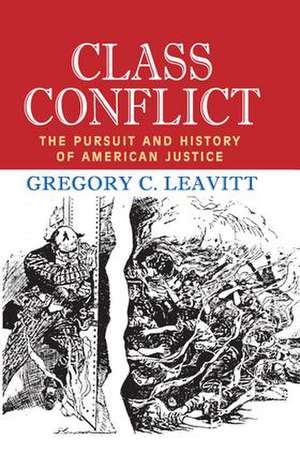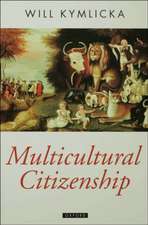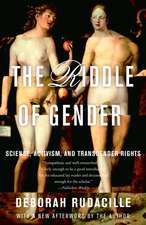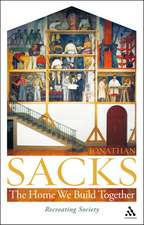Class Conflict: The Pursuit and History of American Justice
Editat de Gregory C. Leavitten Limba Engleză Paperback – 30 aug 2015
Due to the American people's understanding of exclusion and rank, the meaning of justice was fragmented by social status and class. While this book views American justice through a prism of social-class conflict, Gregory C. Leavitt argues that it would be incorrect to portray this perspective as somehow whole. American justice is relative to many cultural groupings and conditions and is thus at the same distance from its encompassing ideal understood by common Americans.
Beginning with the late eighteenth century and ending in the late twentieth century, Leavitt traces the history of class conflict and the struggle for justice among Americans. He argues that class struggles remain a significant factor in American social problems, because the American situation grew out of government promises of freedom and liberty to the lower class and the development of a powerful middle class. This is a provocative contribution to the debate over the future of social justice in America.
| Toate formatele și edițiile | Preț | Express |
|---|---|---|
| Paperback (1) | 411.42 lei 6-8 săpt. | |
| Taylor & Francis – 30 aug 2015 | 411.42 lei 6-8 săpt. | |
| Hardback (1) | 1000.27 lei 6-8 săpt. | |
| Taylor & Francis – 30 apr 2013 | 1000.27 lei 6-8 săpt. |
Preț: 411.42 lei
Nou
Puncte Express: 617
Preț estimativ în valută:
78.73€ • 81.73$ • 65.65£
78.73€ • 81.73$ • 65.65£
Carte tipărită la comandă
Livrare economică 22 martie-05 aprilie
Preluare comenzi: 021 569.72.76
Specificații
ISBN-13: 9781412862394
ISBN-10: 1412862396
Pagini: 264
Dimensiuni: 152 x 229 x 18 mm
Greutate: 0.34 kg
Ediția:1
Editura: Taylor & Francis
Colecția Routledge
Locul publicării:Oxford, United Kingdom
ISBN-10: 1412862396
Pagini: 264
Dimensiuni: 152 x 229 x 18 mm
Greutate: 0.34 kg
Ediția:1
Editura: Taylor & Francis
Colecția Routledge
Locul publicării:Oxford, United Kingdom
Cuprins
Preface 1. American Justice and Social Class: An Introduction Class Tensions and Justice Today An American Sense of Justice Class and Class Consciousness Critical Social Theory and Charles Beard's New History The New History (and the Old) Macrological Studies The Big Picture: The Agricultural Revolution, Social Inequality, and Justice 2. Eighteenth-Century America: The Pre-Revolutionary Era The Evolution of Republicanism: From the Merchant to the Common People The American Gentry The People Violent Confrontations The Tyranny of Taxation: The Social Class Glue 3. The Making of the Constitution The Federalists The Antifederalists The Articles of Confederation and Perpetual Union Pre-Convention Meetings The Twelve 4. The Constitutional Convention Property Rights, Social Inequality, and Justice Secrecy and Government The Economic Principles of the Constitution The Supremacy Clause and Necessary and Proper Clause Judicial Review The Contract Clause War Powers Taxation The Structure of Representation: A Check on the People's House District Voting: All or Nothing and the Two-Party System Ratification of the Constitution 5. The Bill of Rights: Origins and Early Federalist Resistance The Jury: The Cornerstone of Liberty The Bill of Rights and Its Constitutional Status: Barron v. Baltimore (1833) The Fourteenth Amendment and the Incorporation of the Bill of Rights 6. The Rise of the Middle Class The Revolution and the Old Middle Class Post-Revolutionary America: The Federalists and Class Conflict The Democratic-Republican Party: Jeffersonian and Madisonian Democracy The Jeffersonian Revolution of 1800 and the Turn toward Popular Democracy The Industrial Revolution and the Rise of the New Middle Class Justice and the American Middle Class 7. The Party-Democratic Period: 1830s to 1930s Nineteenth-Century Class Conflict The Growing Labor Conflict of the Post Civil War The Progressive Era: Populism, Socialism, and Reform The National Civic Federation, the American Association for Labor Legislation, and the Defeat of Radical Labor Protective Labor Legislation, Business Regulation, Social Security, and the Recognition of Labor Unions 8. The American Justice and Due Process Revolutions Justice and the American Middle Class: Wolfe's Class Morality Project Incorporation of the Bill of Rights: The Due Process Revolution and the Projection of Social Justice Criminal Justice System Reforms: Law Enforcement, Corrections, and Juvenile Justice 9. Class Conflict in the Early Twenty-First Century Class and Justice: A Conclusion References Index
Descriere
In a just society the law not only applies to all equally, but also arises from the consent of the people it embraces














